462 start with F start with F
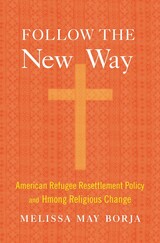
An incisive look at Hmong religion in the United States, where resettled refugees found creative ways to maintain their traditions, even as Christian organizations deputized by the government were granted an outsized influence on the refugees’ new lives.
Every year, members of the Hmong Christian Church of God in Minneapolis gather for a cherished Thanksgiving celebration. But this Thanksgiving takes place in the spring, in remembrance of the turbulent days in May 1975 when thousands of Laotians were evacuated for resettlement in the United States. For many Hmong, passage to America was also a spiritual crossing. As they found novel approaches to living, they also embraced Christianity—called kev cai tshiab, “the new way”—as a means of navigating their complex spiritual landscapes.
Melissa May Borja explores how this religious change happened and what it has meant for Hmong culture. American resettlement policies unintentionally deprived Hmong of the resources necessary for their time-honored rituals, in part because these practices, blending animism, ancestor worship, and shamanism, challenged many Christian-centric definitions of religion. At the same time, because the government delegated much of the resettlement work to Christian organizations, refugees developed close and dependent relationships with Christian groups. Ultimately the Hmong embraced Christianity on their own terms, adjusting to American spiritual life while finding opportunities to preserve their customs.
Follow the New Way illustrates America’s wavering commitments to pluralism and secularism, offering a much-needed investigation into the public work done by religious institutions with the blessing of the state. But in the creation of a Christian-inflected Hmong American animism we see the resilience of tradition—how it deepens under transformative conditions.
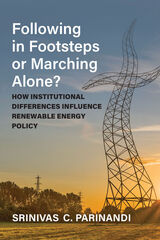
In recent years, the federal government’s increasing inability to address major societal challenges has arguably hampered America’s commitment to renewable energy initiatives. Individual U.S. states have stepped into this void and adopted their own policies, leading some to believe that the states can propel America’s renewable energy industry forward. However, we know little about how legislative and regulatory dynamics within America’s states might accelerate or hinder renewable energy policy creation.
In Following in Footsteps or Marching Alone?, Srinivas Parinandi explores how states have devised their own novel policies, and how the political workings of legislatures and public utilities commissions have impacted state renewable energy policy design. Through the meticulous study of nearly three decades of state-level renewable energy policy-making, he finds that their creation is primarily driven by legislatures, and that ideologically liberal legislatures largely push the envelope. The book suggests that having a predominantly state-driven renewable energy effort can lead to uneven and patchwork-based policy development outcomes, and a possible solution is to try to more successfully federalize these issues. Parinandi urges readers, scholars, and policy practitioners to consider whether a state-led effort is adequate enough to handle the task of building momentum for renewable energy in one of the world’s largest electricity markets.
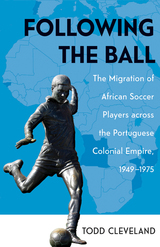
With Following the Ball, Todd Cleveland incorporates labor, sport, diasporic, and imperial history to examine the extraordinary experiences of African football players from Portugal’s African colonies as they relocated to the metropole from 1949 until the conclusion of the colonial era in 1975. The backdrop was Portugal’s increasingly embattled Estado Novo regime, and its attendant use of the players as propaganda to communicate the supposed unity of the metropole and the colonies.
Cleveland zeroes in on the ways that players, such as the great Eusébio, creatively exploited opportunities generated by shifts in the political and occupational landscapes in the waning decades of Portugal’s empire. Drawing on interviews with the players themselves, he shows how they often assumed roles as social and cultural intermediaries and counters reductive histories that have depicted footballers as mere colonial pawns.
To reconstruct these players’ transnational histories, the narrative traces their lives from the informal soccer spaces in colonial Africa to the manicured pitches of Europe, while simultaneously focusing on their off-the-field challenges and successes. By examining this multi-continental space in a single analytical field, the book unearths structural and experiential consistencies and contrasts, and illuminates the components and processes of empire.
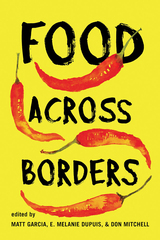
The stories told in Food Across Borders highlight the contiguity between the intimate decisions we make as individuals concerning what we eat and the social and geopolitical processes we enact to secure nourishment, territory, and belonging.
Published in cooperation with the William P. Clements Center for Southwest Studies, Southern Methodist University.

A detailed exploration of parents’ fight for a safe environment for their kids, interrogating how race, class, and gender shape health advocacy
The success of food allergy activism in highlighting the dangers of foodborne allergens shows how illness communities can effectively advocate for the needs of their members. In Food Allergy Advocacy, Danya Glabau follows parents and activists as they fight for allergen-free environments, accurate labeling, the fair application of disability law, and access to life-saving medications for food-allergic children in the United States. At the same time, she shows how this activism also reproduces the culturally dominant politics of personhood and responsibility, based on an idealized version of the American family, centered around white, middle-class, and heteronormative motherhood.
By holding up the threat of food allergens to the white nuclear family to galvanize political and scientific action, Glabau shows, the movement excludes many, including Black women and disabled adults, whose families and health have too often been marginalized from public health and social safety net programs. Further, its strategies are founded on the assumption that market-based solutions will address issues of social exclusion and equal access to healthcare.
Sharing the personal experiences of a wide spectrum of people, including parents, support group leaders, physicians, entrepreneurs, and scientists, Food Allergy Advocacy raises important questions about who controls illness activism. Using critical, intersectional feminism to interrogate how race, class, and gender shape activist priorities and platforms, it shows the way to new, justice-focused models of advocacy.

Food and the City explores the physical, social, and political relations between the production of food and urban settlements. Its thirteen essays discuss the multiple scales and ideologies of productive landscapes—from market gardens in sixteenth-century Paris to polder planning near mid-twentieth century Amsterdam to opportunistic agriculture in today’s Global South—and underscore the symbiotic connection between productive landscape and urban form across times and geographies.
The physical proximity of fruit and vegetable production to urban consumers in pre-revolutionary Paris, or the distribution of fish in Imperial Edo, was an essential factor in shaping both city and surroundings. Colonial expansion and modernist planning stressed the essential relation between urbanism and food production, at the scales of both the garden and agriculture. This volume offers a variety of perspectives—from landscape and architectural history to geography—to connect the garden, market, city, and beyond through the lenses of modernism, technology, scale, social justice, and fashion. Essays on the Fascist new settlements in Ethiopia, Le Corbusier’s Radiant Farm and views on rural France, the urban farms in Israel, and the desakota landscape of the Pearl River Delta, to name a few, will appeal to those concerned with urban, landscape, and architectural studies.
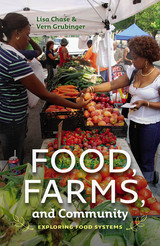
Food, Farms, and Community: Exploring Food Systems takes an in-depth look at critical issues, successful programs, and challenges for improving food systems spanning a few miles to a few thousand miles. Case studies that delve into the values that drive farmers, food advocates, and food entrepreneurs are interwoven with analysis supported by the latest research. Examples of entrepreneurial farms and organizations working together to build sustainable food systems are relevant to the entire country—and reveal results that are about much more than fresh food.
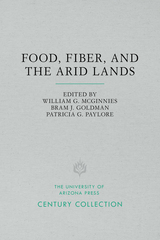
The world’s dramatic awakening to the impact of ecology on the quality of human life, and a new awareness of the potential for exploitation of the desert environment—in which our particular interest lies—give rise to more thoughtful, even sober, attention to the problems faced by those aspiring only to bigger yields from crops and more protein from animals. To these very basic needs of food and fiber, we are, therefore, addressing ourselves further to a consideration of housing, educational programs, and nonagrarian resource evolution, to the end that the planners and the decision makers may have the benefit of the most intelligent and contemporary understanding possible of the cultural and social aspects of arid lands as well as the latest technological advances on a wide-ranging spectrum of scientific developments.
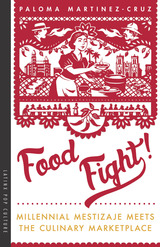
In Food Fight! author Paloma Martinez-Cruz takes us on a Chicanx gastronomic journey that is powerful and humorous. Martinez-Cruz tackles head on the real-world politics of food production from the exploitation of farmworkers to the appropriation of Latinx bodies and culture, and takes us right into transformative eateries that offer a homegrown, mestiza consciousness.
The hard-hitting essays in Food Fight! bring a mestiza critique to today’s pressing discussions of labeling, identity, and imaging in marketing and dining. Not just about food, restaurants, and coffee, this volume employs a decolonial approach and engaging voice to interrogate ways that mestizo, Indigenous, and Latinx peoples are objectified in mainstream ideology and imaginary.

In Food for Dissent, Maria McGrath traces the growth of the natural foods movement from its countercultural fringe beginning to its twenty-first-century "food revolution" ascendance, focusing on popular natural foods touchstones—vegetarian cookbooks, food co-ops, and health advocates. Guided by an ideology of ethical consumption, these institutions and actors spread the movement's oppositionality and transformed America's foodscape, at least for some. Yet this strategy proved an uncertain instrument for the advancement of social justice, environmental defense, and anti-corporatism. The case studies explored in Food for Dissent indicate the limits of using conscientious eating, shopping, and selling as tools for civic activism.
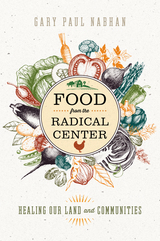
America has never felt more divided. But in the midst of all the acrimony comes one of the most promising movements in our country’s history. People of all races, faiths, and political persuasions are coming together to restore America's natural wealth: its ability to produce healthy foods.
In Food from the Radical Center, Gary Nabhan tells the stories of diverse communities who are getting their hands dirty and bringing back North America's unique fare: bison, sturgeon, camas lilies, ancient grains, turkeys, and more. These efforts have united people from the left and right, rural and urban, faith-based and science-based, in game-changing collaborations. Their successes are extraordinary by any measure, whether economic, ecological, or social. In fact, the restoration of land and rare species has provided—dollar for dollar—one of the best returns on investment of any conservation initiative.
As a leading thinker and seasoned practitioner in biocultural conservation, Nabhan offers a truly unique perspective on the movement. He draws on fifty years of work with community-based projects around the nation, from the desert Southwest to the low country of the Southeast. Yet Nabhan’s most enduring legacy may be his message of hope: a vision of a new environmentalism that is just and inclusive, allowing former adversaries to commune over delicious foods.
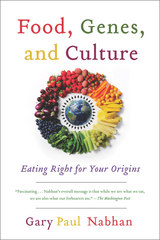
Vegan, low fat, low carb, slow carb: Every diet seems to promise a one-size-fits-all solution to health. But they ignore the diversity of human genes and how they interact with what we eat.
In Food, Genes, and Culture, renowned ethnobotanist Gary Nabhan shows why the perfect diet for one person could be disastrous for another. If your ancestors were herders in Northern Europe, milk might well provide you with important nutrients, whereas if you’re Native American, you have a higher likelihood of lactose intolerance. If your roots lie in the Greek islands, the acclaimed Mediterranean diet might save your heart; if not, all that olive oil could just give you stomach cramps.
Nabhan traces food traditions around the world, from Bali to Mexico, uncovering the links between ancestry and individual responses to food. The implications go well beyond personal taste. Today’s widespread mismatch between diet and genes is leading to serious health conditions, including a dramatic growth over the last 50 years in auto-immune and inflammatory diseases.
Readers will not only learn why diabetes is running rampant among indigenous peoples and heart disease has risen among those of northern European descent, but may find the path to their own perfect diet.

Image by image and hashtag by hashtag, Instagram has redefined the ways we relate to food. Emily J. H. Contois and Zenia Kish edit contributions that explore the massively popular social media platform as a space for self-identification, influence, transformation, and resistance. Artists and journalists join a wide range of scholars to look at food’s connection to Instagram from vantage points as diverse as Hong Kong’s camera-centric foodie culture, the platform’s long history with feminist eateries, and the photography of Australia’s livestock producers. What emerges is a portrait of an arena where people do more than build identities and influence. Users negotiate cultural, social, and economic practices in a place that, for all its democratic potential, reinforces entrenched dynamics of power.
Interdisciplinary in approach and transnational in scope, Food Instagram offers general readers and experts alike new perspectives on an important social media space and its impact on a fundamental area of our lives.
Contributors: Laurence Allard, Joceline Andersen, Emily Buddle, Robin Caldwell, Emily J. H. Contois, Sarah E. Cramer, Gaby David, Deborah A. Harris, KC Hysmith, Alex Ketchum, Katherine Kirkwood, Zenia Kish, Stinne Gunder Strøm Krogager, Jonathan Leer, Yue-Chiu Bonni Leung, Yi-Chieh Jessica Lin, Michael Z. Newman, Tsugumi Okabe, Rachel Phillips, Sarah Garcia Santamaria, Tara J. Schuwerk, Sarah E. Tracy, Emily Truman, Dawn Woolley, and Zara Worth
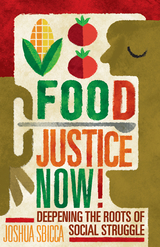
A rallying cry to link the food justice movement to broader social justice debates
The United States is a nation of foodies and food activists, many of them progressives, and yet their overwhelming concern for what they consume often hinders their engagement with social justice more broadly. Food Justice Now! charts a path from food activism to social justice activism that integrates the two. It calls on the food-focused to broaden and deepen their commitment to the struggle against structural inequalities both within and beyond the food system.
In an engrossing, historically grounded, and ethnographically rich narrative, Joshua Sbicca argues that food justice is more than just a myopic focus on food, allowing scholars and activists alike to investigate the causes behind inequities and evaluate and implement political strategies to overcome them. Focusing on carceral, labor, and immigration crises, Sbicca tells the stories of three California-based food movement organizations, showing that when activists use food to confront neoliberal capitalism and institutional racism, they can creatively expand how to practice and achieve food justice.
Sbicca sets his central argument in opposition to apolitical and individual solutions, discussing national food movement campaigns and the need for economically and racially just food policies—a matter of vital public concern with deep implications for building collective power across a diversity of interests.
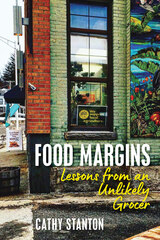
In a food industry shaped by the abundance, cheapness, and convenience that giant corporations can offer, small-scale ventures struggle to survive, as anthropologist Cathy Stanton discovered when she joined the effort to save a small food co-op in a former mill town in western Massachusetts. On the margins of the dominant system, Stanton found herself reckoning with its deep racial and class inequities, and learning that making real change requires a fierce commitment to community and a willingness to change herself as well.
Part memoir and part history lesson, Food Margins traces the tangled economic and political histories of the plantation, the factory, and the supermarket through the life of one New England town. Stanton tells a complex and compelling story of a rural community imagining and creating a viable alternative to the mainstream in a time of increasingly urgent need to build a more socially and ecologically just food system.
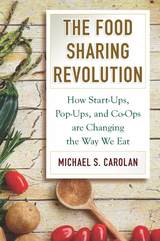
In The Food Sharing Revolution, Michael Carolan tells the stories of traditional producers like Marvin, who are being squeezed by big agribusiness, and entrepreneurs like Josh, who are bucking the corporate food system. The difference is Josh has eschewed the burdens of individual ownership and is tapping into the sharing economy.
Josh and many others are sharing tractors, seeds, kitchen space, their homes, and their cultures. They are business owners like Dorothy, who opened her bakery with the help of a no-interest, crowd-sourced loan. They are chefs like Camilla, who introduces diners to her native Colombian cuisine through peer-to-peer meal sharing. Their success is not only good for aspiring producers, but for everyone who wants an alternative to monocrops and processed foods.
The key to successful sharing, Carolan shows, is actually sharing. He warns that food, just like taxis or hotels, can be co-opted by moneyed interests. But when collaboration is genuine, the sharing economy can offer both producers and eaters freedom, even sovereignty. The result is a healthier, more sustainable, and more ethical way to eat.
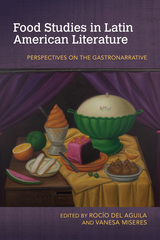
Food Studies in Latin American Literature presents a timely collection of essays analyzing a wide array of Latin American narratives through the lens of food studies. Topics explored include potato and maize in colonial and contemporary global narratives; the role of cooking in Sor Juana Inés de la Cruz’s poetics; the centrality of desire in twentieth-century cooking writing by women; the relationship among food, recipes, and national identity; the role of food in travel narratives; and the impact of advertisements on domestic roles.
The contributors included here—experts in Latin American history, literature, and cultural studies—bring a novel, interdisciplinary approach to these explorations, presenting new perspectives on Latin American literature and culture.
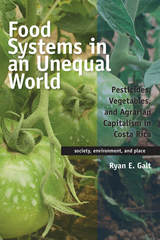
Food Systems in an Unequal World examines the agrochemical-dependent agriculture of Costa Rica and how its uneven regulation in export versus domestic markets affects Costa Rican vegetable farmers. Examining pesticide-dependent vegetable production within two food systems, the author shows that pesticide use is shaped by three main forces: agrarian capitalism, the governance of food systems throughout the commodity chain, and ecological dynamics driving local food production. Those processes produce unequal outcomes that disadvantage less powerful producers who have more limited choices than larger farmers, who usually have access to better growing environments and thereby can reduce pesticide use and production costs.
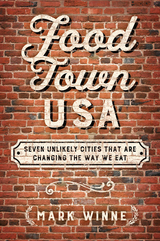
What sparked this revolution? To find out, Mark Winne traveled to seven cities not usually considered revolutionary. He broke bread with brew masters and city council members, farmers and philanthropists, toured start-up incubators and homeless shelters. What he discovered was remarkable, even inspiring.
In Bethlehem, Pennsylvania, once a company steel town, investment in the arts has created a robust new market for local restaurateurs. In Alexandria, Louisiana, “one-stop shopping” food banks help clients apply for health insurance along with SNAP benefits. In Jacksonville, Florida, aeroponics are bringing fresh produce to a food desert.
Over the course of his travels, Winne experienced the power of individuals to transform food and the power of food to transform communities. The cities of Food Town, USA remind us that innovation is ripening all across the country, especially in the most unlikely places.
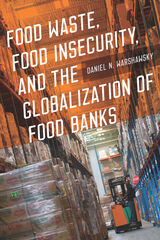
Based on fifteen years of in-depth fieldwork on four continents, Daniel Warshawsky illustrates how and why food banks proliferate across the globe even though their impacts may be limited. He suggests that we need to reformulate the role of food banks. The mission of food banks needs to be more realistic, as food surpluses cannot reduce food insecurity on a significant scale. Food banks need to regain their institutional independence from the state and corporations, and incorporate the knowledge and experiences of the food insecure in the daily operations of the food system. These collective changes can contribute to a future where food banks play a smaller but more targeted role in food systems.

Blue Ridge tacos, kimchi with soup beans and cornbread, family stories hiding in cookbook marginalia, African American mountain gardens—this wide-ranging anthology considers all these and more. Diverse contributors show us that contemporary Appalachian tables and the stories they hold offer new ways into understanding past, present, and future American food practices. The poets, scholars, fiction writers, journalists, and food professionals in these pages show us that what we eat gives a beautifully full picture of Appalachia, where it’s been, and where it’s going.
Contributors: Courtney Balestier, Jessie Blackburn, Karida L. Brown, Danille Elise Christensen, Annette Saunooke Clapsaddle, Michael Croley, Elizabeth S. D. Engelhardt, Robert Gipe, Suronda Gonzalez, Emily Hilliard, Rebecca Gayle Howell, Abigail Huggins, Erica Abrams Locklear, Ronni Lundy, George Ella Lyon, Jeff Mann, Daniel S. Margolies, William Schumann, Lora E. Smith, Emily Wallace, Crystal Wilkinson
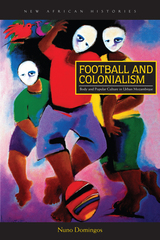
In articles for the newspaper O Brado Africano in the mid-1950s, poet and journalist José Craveirinha described the ways in which the Mozambican football players in the suburbs of Lourenço Marques (now Maputo) adapted the European sport to their own expressive ends. Through gesture, footwork, and patois, they used what Craveirinha termed “malice”—or cunning—to negotiate their places in the colonial state. “These manifestations demand a vast study,” Craveirinha wrote, “which would lead to a greater knowledge of the black man, of his problems, of his clashes with European civilization, in short, to a thorough treatise of useful and instructive ethnography.”
In Football and Colonialism, Nuno Domingos accomplishes that study. Ambitious and meticulously researched, the work draws upon an array of primary sources, including newspapers, national archives, poetry and songs, and interviews with former footballers. Domingos shows how local performances and popular culture practices became sites of an embodied history of Mozambique. The work will break new ground for scholars of African history and politics, urban studies, popular culture, and gendered forms of domination and resistance.
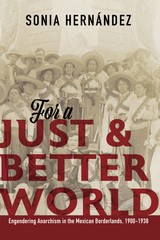
A vivid look at a radical activist and her times, For a Just and Better World illuminates the lives and work of Mexican women battling for labor rights and gender equality in the early twentieth century.

In this new century, born in hope but soon thereafter cloaked in terror, many see religion and politics as a volatile, if not deadly, mixture. For All Peoples and All Nations uncovers a remarkable time when that was not so; when together, those two entities gave rise to a new ideal: universal human rights.
John Nurser has given life to a history almost sadly forgotten, and introduces the reader to the brilliant and heroic people of many faiths who, out of the aftermath of World War II and in the face of cynicism, dismissive animosity, and even ridicule, forged one of the world's most important secular documents, the United Nations's Universal Declaration of Human Rights. These courageous, persistent, visionary individuals—notable among them an American Lutheran Seminary professor from Philadelphia, O. Frederick Nolde—created the Commission on Human Rights. Eventually headed by one of the world's greatest humanitarians, Eleanor Roosevelt, the Universal Declaration has become the touchstone for political legitimacy.
As David Little says in the foreword to this remarkable chronicle, "Both because of the large gap it fills in the story of the founding of the United Nations and the events surrounding the adoption of human rights, and because of the wider message it conveys about religion and peacebuilding, For All Peoples and All Nations is an immensely important contribution. We are all mightily in John Nurser's debt." If religion and politics could once find common ground in the interest of our shared humanity, there is hope that it may yet be found again.
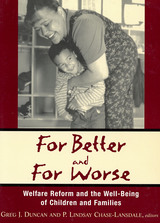
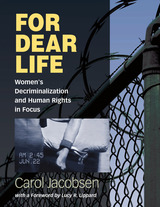

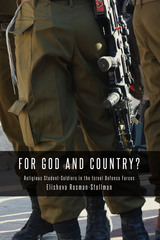
In many modern armies the religious soldier is suspect. Civilians and officers alike wonder if such a soldier might represent a potential fifth column. This concern is especially prominent in the public discourse over the presence of religious Orthodox Jews serving in the Israel Defense Forces. Will they obey their commanding officer or their rabbi? With research collected over almost a decade, including hundreds of hours of interviews, Elisheva Rosman examines this question of loyalties and reveals how religious soldiers negotiate a place for themselves in an institution whose goals and norms sometimes conflict with those of Orthodox Judaism.
For God and Country? focuses on the pre-service study programs available to religious conscripts. Many journalists and scholars in Israel are suspicious of the student-soldiers who participate in these programs, but in fact, as Rosman’s research demonstrates, the pre-service study programs serve as mediating structures between the demands of Religious Zionism and the demands of the Israel Defense Forces and do not encourage their students to disobey orders. This was especially apparent during the disengagement from Gaza in 2005. Many in Israeli society predicted student-soldiers would defy their orders, per the instruction of their religious leaders, but this did not happen as expected. In high profile cases such as this and in matters encountered daily by religious soldiers—the mixing of the sexes, for instance—Rosman has discovered that the pre-service study programs can successfully serve as agents of civil society, both able to curb the military’s efforts to meddle in civilian affairs and vice versa.
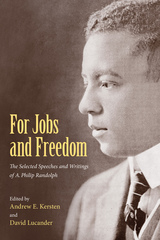
This volume documents Randolph's life and work through his own writings. The editors have combed through the files of libraries, manuscript collections, and newspapers, selecting more than seventy published and unpublished pieces that shed light on Randolph's most significant activities. The book is organized thematically around his major interests—dismantling workplace inequality, expanding civil rights, confronting racial segregation, and building international coalitions. The editors provide a detailed biographical essay that helps to situate the speeches and writings collected in the book. In the absence of an autobiography, this volume offers the best available presentation of Randolph's ideas and arguments in his own words.
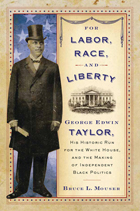
More than one hundred years before Barack Obama, George Edwin Taylor made presidential history. Born in the antebellum South to a slave and a freed woman, Taylor became the first African American ticketed as a political party’s nominee for president of the United States, running against Theodore Roosevelt in 1904.
Orphaned as a child at the peak of the Civil War, Taylor spent several years homeless before boarding a Mississippi riverboat that dropped him in La Crosse, Wisconsin. Taken in by an African American farm family, Taylor attended a private school and eventually rose to prominence as the owner/editor of a labor newspaper and as a vocal leader in Wisconsin’s People’s Party. At a time when many African Americans felt allegiance to the Republican Party for its support of abolition, Taylor’s sympathy with the labor cause drew him first to the national Democratic Party and then to an African American party, the newly formed National Liberty Party, which in 1904 named him its presidential candidate. Bruce L. Mouser follows Taylor’s life and career in Arkansas, Illinois, Wisconsin, Iowa, and Florida, giving life to a figure representing a generation of African American idealists whose initial post-slavery belief in political and social equality in America gave way to the despair of the Jim Crow decades that followed.
Best Books for Special Interests, selected by the American Association for School Libraries
Best Books for Professional Use, selected by the American Association for School Libraries
Best Books for General Audiences, selected by the Public Library Association
Second Place, Biography, Society of Midland Authors
Honorable Mention, Benjamin F. Shambough Award, the State Historical Society of Iowa

Using a rich array of archival sources, Michael Brenes draws important connections between economic inequality and American militarism that enhance our understanding of the Cold War's continued impact on American democracy and the resilience of the military-industrial complex, up to the age of Donald Trump.
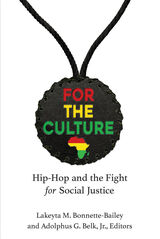
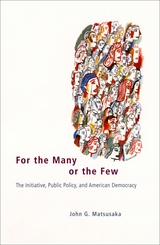
Drawing upon a century of evidence, Matsusaka argues against the popular belief that initiative measures are influenced by wealthy special interest groups that neglect the majority view. Examining demographic, political, and opinion data, he demonstrates how the initiative process brings about systematic changes in tax and expenditure policies of state and local governments that are generally supported by the citizens. He concludes that, by and large, direct democracy in the form of the initiative process works for the benefit of the many rather than the few.
An unprecedented, comprehensive look at the historical, empirical, and theoretical components of how initiatives function within our representative democracy to increase political competition while avoiding the tyranny of the majority, For the Many or the Few is a most timely and definitive work.

Forbes Burnham: The Life and Times of the Comrade Leader is the first political biography of this complex and influential figure. It charts how the political party he founded, the People’s National Congress, combined nationalist rhetoric, socialist policies, and Pan-Africanist philosophies. It also explores how, in a country already deeply divided between the descendants of African slaves and Indian indentured servants, Burnham consolidated political power by intensifying ethnic polarizations. Drawing from historical archives as well as new interviews with the people who knew Burnham best, sociologist Linden F. Lewis examines how his dictatorial tendencies coexisted with his progressive convictions. Forbes Burnham is a compelling study of the nature of postcolonial leadership and its pitfalls.

Moral theologians, defense analysts, conflict scholars, and nuclear experts imagine a world free from nuclear weapons
At a 2017 Vatican conference, Pope Francis condemned nuclear weapons. This volume, issued after the 60th anniversary of the Cuban Missile Crisis, presents essays from moral theologians, defense analysts, conflict transformation scholars, and nuclear arms control experts, with testimonies from witnesses. It is a companion volume to A World Free from Nuclear Weapons: The Vatican Conference on Disarmament (Georgetown University Press, 2020).
Chapters from the perspectives of missile personnel and the military chain of command, industrialists and legislators, and citizen activists show how we might achieve a nuclear-free world. Key to this transition is the important role of public education and the mobilization of lay movements to raise awareness and effect change. This essential collection prepares military professionals, policymakers, everyday citizens, and the pastoral workers who guide them, to make decisions that will lead us to disarmament.
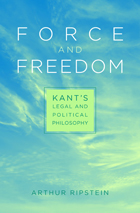
In this masterful work, both an illumination of Kant’s thought and an important contribution to contemporary legal and political theory, Arthur Ripstein gives a comprehensive yet accessible account of Kant’s political philosophy. Ripstein shows that Kant’s thought is organized around two central claims: first, that legal institutions are not simply responses to human limitations or circumstances; indeed the requirements of justice can be articulated without recourse to views about human inclinations and vulnerabilities. Second, Kant argues for a distinctive moral principle, which restricts the legitimate use of force to the creation of a system of equal freedom. Ripstein’s description of the unity and philosophical plausibility of this dimension of Kant’s thought will be a revelation to political and legal scholars.
In addition to providing a clear and coherent statement of the most misunderstood of Kant’s ideas, Ripstein also shows that Kant’s views remain conceptually powerful and morally appealing today. Ripstein defends the idea of equal freedom by examining several substantive areas of law—private rights, constitutional law, police powers, and punishment—and by demonstrating the compelling advantages of the Kantian framework over competing approaches.

Smith argues that it was routine, rather than fear, that kept the lid on Brazil's press. The banality of state censorship-a mundane, encompassing set of automatically repeated procedures that functioned much like any other state bureaucracy-seemed impossible to circumvent. While the press did not consider the censorship legitimate, they were never able to develop the resources to overcome censorship's burdensome routines.
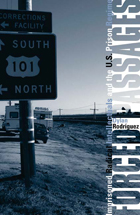
In Forced Passages, Dylan Rodríguez argues that the cultural production of such imprisoned intellectuals as Mumia Abu-Jamal, Angela Davis, Leonard Peltier, George Jackson, José Solis Jordan, Ramsey Muniz, Viet Mike Ngo, and Marilyn Buck should be understood as a social and intellectual movement in and of itself, unique in context and substance. Rodríguez engages with a wide range of texts, including correspondence, memoirs, essays, poetry, communiqués, visual art, and legal writing, drawing on published works by widely recognized figures and by individuals outside the public’s field of political vision or concern. Throughout, Rodríguez focuses on the conditions under which imprisoned intellectuals live and work, and he explores how incarceration shapes the ways in which insurgent knowledge is created, disseminated, and received.
More than a series of close readings of prison literature, Forced Passages identifies and traces the discrete lineage of radical prison thought since the 1970s, one formed by the logic of state violence and by the endemic racism of the criminal justice system.
Dylan Rodríguez is assistant professor of ethnic studies at the University of California, Riverside.
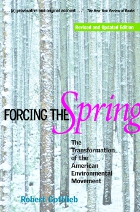
This revised edition extends the groundbreaking history and analysis of Forcing the Spring into the present day. It updates the original with important new material that brings the book's themes and arguments into the 21st century, addressing topics such as: the controversy spawned by the original edition with regard to how environmentalism is, or should be, defined; new groups and movements that have formed in the past decade; change and development in the overall environmental movement from 1993 to 2004; the changing role of race, class, gender, and ethnicity in today's environmentalism; the impact of the 2004 presidential election; the emergence of "the next environmentalism."
Forcing the Spring, Revised Edition considers environmentalism as a contemporary movement focused on "where we live, work, and play," touching on such hot-button topics as globalization, food, immigration, and sprawl. The book also describes the need for a "next environmentalism" that can address current challenges, and considers the barriers and opportunities associated with this new, more expansive approach.
Forcing the Spring, Revised Edition is an important contribution for students and faculty in a wide variety of fields including history, sociology, political science, environmental studies, environmental history, and social movements. It also offers useful context and analysis for anyone concerned with environmental issues.
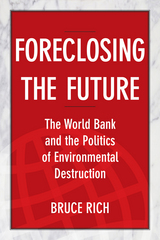
If anyone has the answer, it is arguably Bruce Rich—a lawyer and expert in public international finance who has for the last three decades studied the Bank’s institutional contortions, the real-world consequences of its lending, and the politics of the global environmental crisis. What emerges from the bureaucratic dust is a disturbing and gripping story of corruption, larger-than-life personalities, perverse incentives, and institutional amnesia. The World Bank is the Vatican of development finance, and its dysfunction plays out as a reflection of the political hypocrisies and failures of governance of its 188 member countries.
Foreclosing the Future shows how the Bank’s failure to address the challenges of the 21st Century has implications for everyone in an increasingly interdependent world. Rich depicts how the World Bank is a microcosm of global political and economic trends—powerful forces that threaten both environmental and social ruin. Rich shows how the Bank has reinforced these forces, undercutting the most idealistic attempts at alleviating poverty and sustaining the environment, and damaging the lives of millions. Readers will see global politics on an increasingly crowded planet as they never have before—and come to understand the changes necessary if the World Bank is ever to achieve its mission.
To review the references and notes with links to articles, please click on the "Resources" tab at https://islandpress.org/foreclosing-the-future.
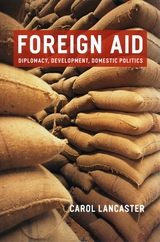
A twentieth-century innovation, foreign aid has become a familiar and even expected element in international relations. But scholars and government officials continue to debate why countries provide it: some claim that it is primarily a tool of diplomacy, some argue that it is largely intended to support development in poor countries, and still others point out its myriad newer uses. Carol Lancaster effectively puts this dispute to rest here by providing the most comprehensive answer yet to the question of why governments give foreign aid. She argues that because of domestic politics in aid-giving countries, it has always been—and will continue to be—used to achieve a mixture of different goals.
Drawing on her expertise in both comparative politics and international relations and on her experience as a former public official, Lancaster provides five in-depth case studies—the United States, Japan, France, Germany, and Denmark—that demonstrate how domestic politics and international pressures combine to shape how and why donor governments give aid. In doing so, she explores the impact on foreign aid of political institutions, interest groups, and the ways governments organize their giving. Her findings provide essential insight for scholars of international relations and comparative politics, as well as anyone involved with foreign aid or foreign policy.

An exploration of the nuclear arms race and the dangers arising with the advent of “limited warfare”
After the development of the atomic bomb in 1945, Americans became engaged in a "new kind of war" against totalitarianism. Enemies and objectives slipped out of focus, causing political and military aims to mesh as a struggle to contain communism both at home and abroad encompassed civilians as well as soldiers. In matters relating to Vietnam, Central America, and the nuclear arms race, the domestic and foreign dimensions of each issue became inseparable. Policymakers in Washington had to formulate strategies dictated by "limited war" in their search for peace.
Contributors to this volume demonstrate the multifaceted nature of modern warfare. Robert H. Ferrell establishes the importance of studying military history in understanding the post-World War II era. On Vietnam, Colonel Harry G. Summers, Jr., gives an intriguing argument regarding the U. S. Army; George C. Herring examines how America's decisions in 1954 assured deepened involvement; and Captain Mark Clodfelter uncovers new evidence concerning "Linebacker I." On the home front, Robert F. Burk analyzes the impact of the Cold War on the battle for racial justice; Charles DeBenedetti puts forth a challenging interpretation of the antiwar movement; and James C. Schneider provides perspective on the relationship between the Vietnam War and the Great Society. On Central America, two writers downplay communism in explaining the region's troubles. Ralph Lee Woodward, Jr., fits the Nicaraguan revolution in the long span of history, and Thomas M. Leonard shows how the Reagan administration forced Costa Rica to side with the United States's anti-Sandinista policy. Finally, on nuclear strategy, Donald M. Snow offers a thought-provoking assessment of the "star wars" program, and Daniel S. Papp recommends measures to promote understanding among the superpowers.
These essays demonstrate that the making of foreign policy is immensely complicated, not subject to easy solution or to simple explanation. Despite these complexities, the central objective of policymakers remained clear: to safeguard what was perceived as the national interest.
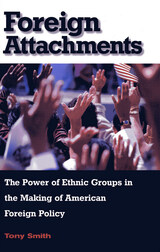
Who speaks for America in world affairs? In this insightful new book, Tony Smith finds that, often, the answer is interest groups, including ethnic ones. This seems natural in a country defined by ethnic and cultural diversity and a democratic political system. And yet, should not the nation's foreign policy be based on more general interests? On American national interests?
In exploring this question, Smith ranges over the history of ethnic group involvement in foreign affairs; he notes the openness of our political system to interest groups; and he investigates the relationship between multiculturalism and U.S. foreign policy. The book has three major propositions. First, ethnic groups play a larger role in the formulation of American foreign policy than is widely recognized. Second, the negative consequences of ethnic group involvement today outweigh the benefits this activism at times confers on America in world affairs. And third, the tensions of a pluralist democracy are particularly apparent in the making of foreign policy, where the self-interested demands of a host of domestic actors raise an enduring problem of democratic citizenship--the need to reconcile general and particular interests.
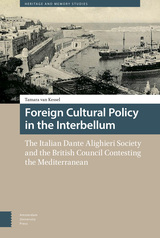

More than four million U.S. citizens currently live in five “unincorporated” U.S. territories. The inhabitants of these vestiges of an American empire are denied full representation in Congress and cannot vote in presidential elections. Focusing on Puerto Rico, the largest and most populous of the territories, Foreign in a Domestic Sense sheds much-needed light on the United States’ unfinished colonial experiment and its legacy of racially rooted imperialism, while insisting on the centrality of these “marginal” regions in any serious treatment of American constitutional history. For one hundred years, Puerto Ricans have struggled to define their place in a nation that neither wants them nor wants to let them go. They are caught in a debate too politicized to yield meaningful answers. Meanwhile, doubts concerning the constitutionality of keeping colonies have languished on the margins of mainstream scholarship, overlooked by scholars outside the island and ignored by the nation at large.
This book does more than simply fill a glaring omission in the study of race, cultural identity, and the Constitution; it also makes a crucial contribution to the study of American federalism, serves as a foundation for substantive debate on Puerto Rico’s status, and meets an urgent need for dialogue on territorial status between the mainlandd and the territories.
Contributors. José Julián Álvarez González, Roberto Aponte Toro, Christina Duffy Burnett, José A. Cabranes, Sanford Levinson, Burke Marshall, Gerald L. Neuman, Angel R. Oquendo, Juan Perea, Efrén Rivera Ramos, Rogers M. Smith, E. Robert Statham Jr., Brook Thomas, Richard Thornburgh, Juan R. Torruella, José Trías Monge, Mark Tushnet, Mark Weiner

Much has been written about the Office of Strategic Services (OSS)--the forerunner of the CIA--and the exploits of its agents during World War II. Virtually unknown, however, is the work of the extraordinary community of scholars who were handpicked by "Wild Bill" Donovan and William L. Langer and recruited for wartime service in the OSS's Research and Analysis Branch (R&A). Known to insiders as the "Chairborne Division," the faculty of R&A was drawn from a dozen social science disciplines and challenged to apply its academic skills in the struggle against fascism. Its mandate: to collect, analyze, and disseminate intelligence about the enemy.
Foreign Intelligence is the first comprehensive history of this extraordinary behind-the-scenes group. The R&A Branch assembled scholars of widely divergent traditions and practices--Americans and recent European émigrés; philosophers, historians, and economists; regionalists and functionalists; Marxists and positivists--all engaged in the heady task of translating the abstractions of academic discourse into practical politics. Drawing on extensive, newly declassified archival sources, Barry M. Katz traces the careers of the key players in R&A, whose assessments helped to shape U.S. policy both during and after the war. He shows how these scholars, who included some of the most influential theorists of our time, laid the foundation of modern intelligence work. Their reports introduced the theories and methods of academic discourse into the workings of government, and when they returned to their universities after the war, their wartime experience forever transformed the world of scholarship.
Authoritative, probing, and wholly original, Foreign Intelligence not only sheds new light on this overlooked aspect of the U.S. intelligence record, it also offers a startling perspective on the history of intellectual thought in the twentieth century.
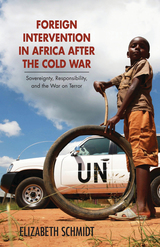
In Foreign Intervention in Africa after the Cold War—interdisciplinary in approach and intended for nonspecialists—Elizabeth Schmidt provides a new framework for thinking about foreign political and military intervention in Africa, its purposes, and its consequences. She focuses on the quarter century following the Cold War (1991–2017), when neighboring states and subregional, regional, and global organizations and networks joined extracontinental powers in support of diverse forces in the war-making and peace-building processes. During this period, two rationales were used to justify intervention: a response to instability, with the corollary of responsibility to protect, and the war on terror.
Often overlooked in discussions of poverty and violence in Africa is the fact that many of the challenges facing the continent today are rooted in colonial political and economic practices, in Cold War alliances, and in attempts by outsiders to influence African political and economic systems during the decolonization and postindependence periods. Although conflicts in Africa emerged from local issues, external political and military interventions altered their dynamics and rendered them more lethal. Foreign Intervention in Africa after the Cold War counters oversimplification and distortions and offers a new continentwide perspective, illuminated by trenchant case studies.
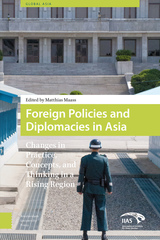
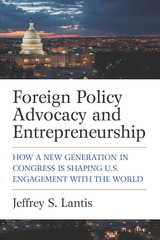
Cases of entrepreneurship by junior members of Congress represent a puzzle for traditional foreign policy studies that focus on seniority, party discipline, and rigid institutional systems on Capitol Hill. By melding entrepreneurship and policy advocacy literature, this book advances a new typology of foreign policy entrepreneurship, recognizing the impact of multidimensional strategies of influence. The arrival of new members of the 116th Congress, the most diverse in history, provides an exciting laboratory to further test these propositions.
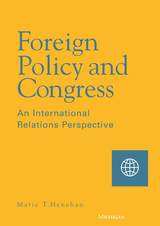
In recent years political scientists have begun to consider the impact of the international system on domestic policy. Part of the difficulty of some of this work, as well as work on Congress's role in foreign policy, is that it has been limited in terms of time and the number of events the analysis considered, depending on case studies. This book offers a systematic consideration of the effects of international events on domestic politics, crossing many different kinds of international activity, and provides a unique longitudinal view of Congressional action on foreign policy.
This book will be of interest to scholars of international relations, American foreign policy making, and Congress.
Marie T. Henehan is Assistant Professor of Political Science, Vanderbilt University.
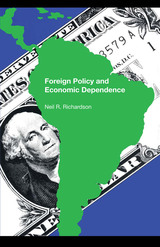
In an era of increasing interdependence among nations, the foreign policies of poor countries are becoming a subject of critical interest to scholars and the public alike. Neil R. Richardson adopts a political economy perspective to examine the foreign policy repercussions of international economic dependence.
Are dependent countries compliant in their foreign policies, acquiescing to the preferences of the industrial giants on which they rely for foreign trade, investment, and aid revenues? Or are they instead prepared to defy their dominant economic partners? These are the major concerns of Richardson’s rigorous investigation.
The book begins with a characterization of economic dependence and its possible impact on the foreign policy decisions of dependent governments. Ideas from both “interdependence” and dependencia scholarship are extracted in order to explain the reliance of poor countries on their rich partners. These economics are linked to the foreign policies of poorer countries by considering how the mechanisms of dependence may create pressures on foreign policymakers. Several combinations of pressures are plausible, and each set yields a differing expectation about their foreign policies.
The second part of the book is an empirical test of these foreign policy predictions for the years 1950–1973. Richardson analyzes the foreign policy behavior (as reflected in certain votes in the United Nations General Assembly) of a number of poor countries that are economically dependent on the United States to varying degrees.
The results suggest several surprising conclusions. Contrary to one common assumption, these mostly Latin American and Caribbean countries are not necessarily locked into a condition of perpetual dependence. Richardson finds that the foreign policies of the economic dependencies are not easily manipulated by the United States. Not only do annual changes in their external economic reliance fail to correspond to their U.N. voting behavior, but the dependencies as a group are no longer clear voting allies of the United States after the late 1960s. These and other results bear theoretical and policy implications that conclude the book.
Foreign Policy and Economic Dependence will be of interest to specialists in quantitative international relations and American foreign policy.
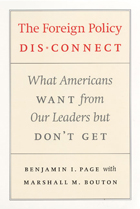
With world affairs so troubled, what kind of foreign policy should the United States pursue? Benjamin Page and Marshall Bouton look for answers in a surprising place: among the American people. Drawing on a series of national surveys conducted between 1974 and 2004, Page and Bouton reveal that—contrary to conventional wisdom—Americans generally hold durable, coherent, and sensible opinions about foreign policy. Nonetheless, their opinions often stand in opposition to those of policymakers, usually because of different interests and values, rather than superior wisdom among the elite. The Foreign Policy Disconnect argues that these gaps between leaders and the public are harmful, and that by using public opinion as a guideline policymakers could craft a more effective, sustainable, and democratic foreign policy.
Page and Bouton support this argument by painting a uniquely comprehensive portrait of the military, diplomatic, and economic foreign policies Americans favor. They show, for example, that protecting American jobs is just as important to the public as security from attack, a goal the current administration seems to pursue single-mindedly. And contrary to some officials’ unilateral tendencies, the public consistently and overwhelmingly favors cooperative multilateral policy and participation in international treaties. Moreover, Americans’ foreign policy opinions are seldom divided along the usual lines: majorities of virtually all social, ideological, and partisan groups seek a policy that pursues the goals of security and justice through cooperative means. Written in a clear and engaging style, The Foreign Policy Disconnect calls, in an original voice, for a more democratic approach to creating such a policy.
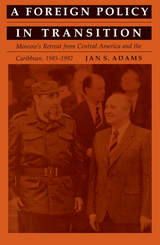
Jan S. Adams analyzes the factors shaping Gorbachev's foreign policy in Central America by surveying Soviet political views old and new, by describing Gorbachev's bold restructuring of the Soviet foreign policy establishment, and by assessing the implications of his policy of perestroika. A series of country studies demonstrates how changes in Soviet policies and domestic and economic circumstances contributed to significant shifts in the internal conditions and external relations of the Central American and Caribbean nations. Adams discusses in detail such topics as the reduction of Soviet military and economic aid to the region and pressures exerted by Moscow on client states to effect the settlement of regional conflicts by political rather than military means.
The author concludes by speculating about which trends in foreign policy by Russia and other Soviet-successor states toward Central America and the Caribbean may persist in the post-Soviet period, discussing as the implications of these changes for future U.S. policy in the region.
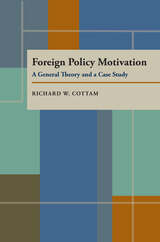
Foreign policy motivation is a complex mix reflecting the fears and aspirations of publics, interest groups, bureaucratic sets, and important individuals. International conflict cannot be resolved without resolving how foreign policy is motivated. This book presents a conceptual framework for identifying and weighing foreign policy motives that shape, direct, and alter foreign policy.
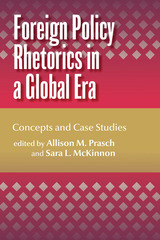
Among the cases researched in this collection are foreign policy rhetoric from Cold War foreign policy in Latin America, the rhetoric of Vladimir Putin’s Ukraine war messages, and the development challenges of the Ford Foundation and the Kenya Women Finance Trust, among many others.
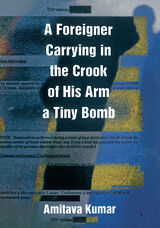
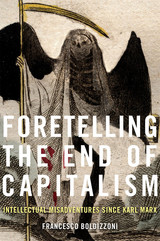
Intellectuals since the Industrial Revolution have been obsessed with whether, when, and why capitalism will collapse. This riveting account of two centuries of failed forecasts of doom reveals the key to capitalism’s durability.
Prophecies about the end of capitalism are as old as capitalism itself. None have come true. Yet, whether out of hope or fear, we keep looking for harbingers of doom. In Foretelling the End of Capitalism, Francesco Boldizzoni gets to the root of the human need to imagine a different and better world and offers a compelling solution to the puzzle of why capitalism has been able to survive so many shocks and setbacks.
Capitalism entered the twenty-first century triumphant, its communist rival consigned to the past. But the Great Recession and worsening inequality have undermined faith in its stability and revived questions about its long-term prospects. Is capitalism on its way out? If so, what might replace it? And if it does endure, how will it cope with future social and environmental crises and the inevitable costs of creative destruction? Boldizzoni shows that these and other questions have stood at the heart of much analysis and speculation from the early socialists and Karl Marx to the Occupy Movement. Capitalism has survived predictions of its demise not, as many think, because of its economic efficiency or any intrinsic virtues of markets but because it is ingrained in the hierarchical and individualistic structure of modern Western societies.
Foretelling the End of Capitalism takes us on a fascinating journey through two centuries of unfulfilled prophecies. An intellectual tour de force and a plea for political action, it will change our understanding of the economic system that determines the fabric of our lives.

Some of his key findings include:
- U.S. debt is approaching 100 percent of GDP, the highest level since World War II.
- By 2050, debt is on track to reach an unprecedented 145 percent of GDP. Under one pessimistic (but probably more realistic) scenario, CBO estimates that debt could rise to 244 percent of GDP, which means lights out.
- By 2050, federal spending is projected to exceed 29 percent of GDP, levels not seen since the height of World War II. We’re on track to spending more money on baby boomers in retirement than we did to defeat the Nazis.
- Since 1984, the median net worth for households headed by someone under the age of 35 has declined 68 percent. For retirement age households, net worth has increased 42 percent over that same period. The result is the largest generational wealth gap in history. Boomers did better than their kids in early adulthood, and will do better than their kids in retirement.
- As millennials remain childless and single for longer, they face one of the highest tax rates (16.9 percent) for their demographic in the developed world.
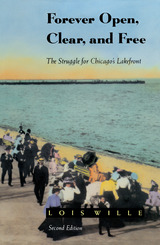
Illustrated with historic and contemporary photographs, Wille's book tells how Chicago's lakefront has survived a century of development. The story serves as a warning to anyone who thinks the struggle for the lakefront is over, or who takes for granted the beauty of its public beaches and parks.
"A thoroughly fascinating and well-documented narrative which draws the reader into the sights, smells and sounds of Chicago's story. . . . Everyone who cares about the development of land and its conservation will benefit from reading Miss Wille's book."—Daniel J. Shannon, Architectural Forum
"Not only good reading, it is also a splendid example of how to equip concerned citizens for their necessary participation in the politics of planning and a more livable environment."—Library Journal

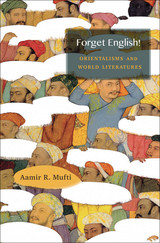
A Choice Outstanding Academic Title of the Year
The idea of world literature has garnered much attention recently as a discipline that promises to move humanistic study beyond postcolonial theory and antiquated paradigms of “national” literary traditions. In Forget English! Aamir Mufti scrutinizes the claims made on behalf of world literature by its advocates. The notion of a borderless, egalitarian global literature has obvious appeal, he notes, but behind it lurks the continuing dominance of English as a literary language and a cultural system of international reach.
“Mufti’s historical perspective and insightful analyses of India’s anglophone novel generate constant echoes with the realities of anglophone writings in other cultures.”
—Eva Shan Chou, Times Higher Education
“Mufti’s book is in one sense a quarrel with Salman Rushdie’s overly enthusiastic celebration of English-language ‘postcolonial’ South Asian literature, but more important, the book extends, qualifies, and enriches Edward Said’s work on Orientalism, demonstrating that despite its promise, world literature does not eliminate the dominant role of the Anglophone book market in shaping South Asian literature…Mufti’s book is both accessible and theoretically informed.”
—K. Tölölyan, Choice

In examining these issues, the writers consider such prob-lems as the trade-off between the benefits of international economic cooperation and the ability to pursue domestic welfare policies; how to increase the political accountability of the institutions of the EU; and how the EU can both be enlarged in membership and deepened in terms of the powers given community institutions.
The contributors are Steven Arndt, Peter Bofinger, Christian de Boisseu, Michele Fratianni, Geoffrey Garrett, Jurgen von Hagen, Ander Todal Jenssen, Ken Kletzer, Lisa Martin, Jonathan Moses, Jean Pisani-Ferry, and Michael Wallerstein, in addition to the editors.
Barry Eichengreen is Professor of Economics, University of California, Berkeley. Jeffry Frieden is Professor of Government, Harvard University.
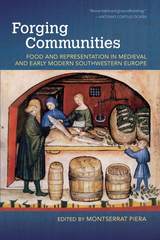
This interdisciplinary study of food in medieval and early modern communities connects threads of history conventionally examined separately or in isolation. The intersection of foodstuffs with politics, religion, economics, and culture enhances our understanding of historical developments and cultural continuities through the centuries, giving insight that today, as much as in the past, we are what we eat and what we eat is never devoid of meaning.
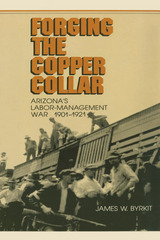
Just after dawn, two thousand armed vigilantes took to the streets of this remote Arizona mining town to round up members and sympathizers of the radical Industrial Workers of the World. Before the morning was over, nearly twelve hundred alleged Wobblies had been herded onto waiting boxcars. By day's end, they had been hauled off to New Mexico.
While the Bisbee Deportation was the most notorious of many vigilante actions of its day, it was more than the climax of a labor-management war—it was the point at which Arizona donned the copper collar. That such an event could occur, James Byrkit contends, was not attributable so much to the marshaling of public sentiment against the I.W.W. as to the outright manipulation of the state's political and social climate by Eastern business interests.
In Forging the Copper Collar, Byrkit paints a vivid picture of Arizona in the early part of this century. He demonstrates how isolated mining communities were no more than mercantilistic colonies controlled by Eastern power, and how that power wielded control over all the Arizona's affairs—holding back unionism, creating a self-serving tax structure, and summarily expelling dissidents.
Because the years have obscured this incident and its background, the writing of Copper Collar involved extensive research and verification of facts. The result is a book that captures not only the turbulence of an era, but also the political heritage of a state.
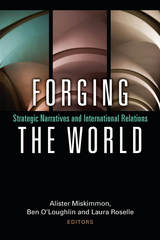
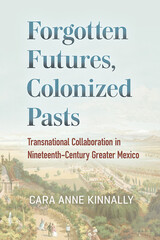
Published by Bucknell University Press. Distributed worldwide by Rutgers University Press.
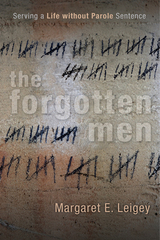

In 1894, on the eve of the French conquest of Morocco, a young Muslim mystic named Muḥammad al-Kattānī decided to abandon his life of asceticism to preach Islamic revival and jihad against the French. Ten years later, al-Kattānī mobilized a socially diverse coalition of Moroccans who called for resistance against French colonization.
In 1909, he met a violent death at the hands of the same Moroccan anti-colonialists he had empowered through his activism. Today, the government of Morocco regards al-Kattānī’s story as subversive, and he has virtually disappeared from the narratives of the early Moroccan anti-colonialism and nationalism. Despite this silencing, al-Kattānī’s remarkable personal transformation and sacrifice is at the heart of the events that, although ultimately failing to prevent French rule, gave birth to Moroccan nationalism and to modern concepts of Moroccan political power and authority.
Forgotten Saints draws on a diverse collection of previously unknown primary sources to narrate the vivid story of al-Kattānī and his virtual disappearance from accounts of modern Moroccan history.

A formal model in the social sciences builds explanations when it structures the reasoning underlying a theoretical argument, opens venues for controlled experimentation, and can lead to hypotheses. Yet more importantly, models evaluate theory, build theory, and enhance conjectures. Formal Modeling in Social Science addresses the varied helpful roles of formal models and goes further to take up more fundamental considerations of epistemology and methodology.
The authors integrate the exposition of the epistemology and the methodology of modeling and argue that these two reinforce each other. They illustrate the process of designing an original model suited to the puzzle at hand, using multiple methods in diverse substantive areas of inquiry. The authors also emphasize the crucial, though underappreciated, role of a narrative in the progression from theory to model.
Transparency of assumptions and steps in a model means that any analyst will reach equivalent predictions whenever she replicates the argument. Hence, models enable theoretical replication, essential in the accumulation of knowledge. Formal Modeling in Social Science speaks to scholars in different career stages and disciplines and with varying expertise in modeling.

Here is the history of the disintegration of the Russian Empire, and the emergence, on its ruins, of a multinational Communist state. In this revealing account, Richard Pipes tells how the Communists exploited the new nationalism of the peoples of the Ukraine, Belorussia, the Caucasus, Central Asia, and the Volga-Ural area--first to seize power and then to expand into the borderlands.
The Formation of the Soviet Union acquires special relevance in the post-Soviet era, when the ethnic groups described in the book once again reclaimed their independence, this time apparently for good.
In a 1996 Preface to the Revised Edition, Pipes suggests how material recently released from the Russian archives might supplement his account.
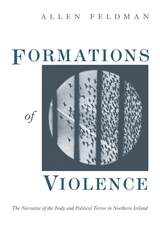
"A sophisticated and persuasive late-modernist political analysis that consistently draws the reader into the narratives of the author and those of the people of violence in Northern Ireland to whom he talked. . . . Simply put, this book is a feast for the intellect"—Thomas M. Wilson, American Anthropologist
"One of the best books to have been written on Northern Ireland. . . . A highly imagination and significant book. Formations of Violence is an important addition to the literature on political violence."—David E. Schmitt, American Political Science Review
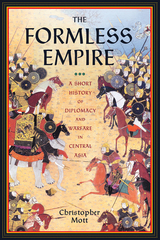
Central Asia, a vast region extending from eastern Russia and across Kazakhstan, Uzbekistan, Turkmenistan, Afghanistan, Tajikistan, Kyrgystan, Mongolia, and western China, has its own tradition of foreign policy rooted in the ancient nomadic culture of many of its peoples as well as the region’s distinctive geography. From the thundering hooves of Mongol or Cossack cavalry across the steppes to the clanking of tanks on parade in Moscow or Beijing, elements of this system still cast a shadow on the region at the heart of Earth’s largest continent. By tracing the evolution of Central Asian warfare and diplomacy through a series of historical examples, ranging from the ancient Xiongnu people and medieval Mongol Empire to the fall of the Soviet Union, historian Christopher Mott argues that the original system of informal relationships, indirect rule, and rapid military movement did not entirely fade from the region with the eclipse of the nomadic powers during the Middle Ages. In fact, many states like China, Iran, and Russia had already been influenced by nomadic people, and in so doing adapted their own diplomatic and military policies accordingly. The Formless Empire: A Short History of Diplomacy and Warfare in Central Asia is an engaging study of the nature of non-Western imperialism and great-power strategy. In addition, the book demonstrates that regional histories can show us the variety of political possibilities in the past and how they were adapted to changing circumstances—a point made even more important by the rapid changes facing global security and new forms of empire building.
“Christopher Mott’s extremely erudite and wide-ranging examination of the history of Central Asia shows us that we have been far too narrow-minded and Eurocentric in thinking about power and how the global system changes historically. Given the current interest in ‘caliphates’ we need to reflect on the history of the areas of the world that dance to a different historical drum than we do in the West.” —Andrew John Williams, author of France, Britain, and the United States in the Twentieth Century
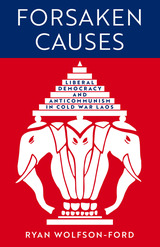
Forsaken Causes offers a groundbreaking intellectual history of the Royal Lao Government (RLG) from 1945 to 1975. In Ryan Wolfson-Ford’s account, the Lao people emerge as not merely pawns of the superpowers but agents in their own right, with the Lao elite wielding particular influence over the nation’s trajectory. Their prevailing ideologies—liberal democracy and anticommunism—were not imposed from outside, but rather established by Lao themselves in the fight against French colonialism. These ideologies were rooted in Lao culture, which prized its traditional monarchy, Buddhist faith, French learning, and nationalist conception of a Lao race. Against histories that have dismissed Lao elites as instruments of foreign powers, Wolfson-Ford shows that the RLG charted its own course, guided by complex motivations, rationales, and beliefs. During this time Lao enjoyed unprecedented democratic freedoms, many of which have not been seen since the government fell to communist takeover in 1975.
By recentering the Lao in their own history, Wolfson-Ford restores our understanding of this robust but often forgotten liberal democracy, recovers lost voices, and broadens our understanding of postcolonial and Cold War Southeast Asia as a whole.


Hanna Pitkin's provocative and enduring study of Machiavelli was the first to systematically place gender at the center of its exploration of his political thought. In this edition, Pitkin adds a new afterword, in which she discusses the book's critical reception and situates the book's arguments in the context of recent interpretations of Machiavelli's thought.
"A close and often brilliant exegesis of Machiavelli's writings."—The American Political Science Review
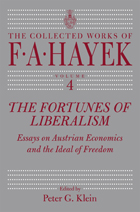
The Reagan and Thatcher "revolutions." The collapse of Eastern Europe dramatically captured in the tearing down of the Berlin Wall. F. A. Hayek, "grand old man of capitalism" and founder of the classical liberal, free-market revival which ignited and inspired these world events, forcefully predicted their occurrence in writings such as The Road to Serfdom, first published in 1944.
Hayek's well-known social and political philosophy—in particular his long-held pessimistic view of the prospects of socialism, irrefutably vindicated by the recent collapse of the Eastern bloc—is fully grounded in the Austrian approach to economics. In this new collection, Hayek traces his intellectual roots to the Austrian school, the century-old tradition founded at the University of Vienna by Carl Menger, and links it to the modern rebirth of classical liberal or libertarian thought.
As Hayek reminds us, the cornerstone of modern economics—the theory of value and price—"represents a consistent continuation of the fundamental principles handed down by the Vienna school." Here, in this first modern collection of essays on the Austrian school by one of its preeminent figures, is the genesis of this tradition and its place in intellectual history.
Reflections on Hayek's days as a young economic theorist in Vienna, his opening address to the inaugural meeting of the Mont Pèlerin Society, and essays on former teachers and other leading figures in the Austrian school are included in volume 4. Two hitherto unavailable memoirs, "The Economics of the 1920s as Seen from Vienna," published here for the first time, and "The Rediscovery of Freedom: Personal Recollections," available for the first time in English, make this collection invaluable for Hayek scholars.
Hayek's writings continue to provide an invaluable education in a subject which is nothing less than the development of the modern world.
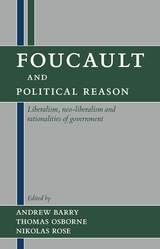
These twelve essays provide a critical introduction to Foucault's work on politics, exploring its relevance to past and current thinking about liberal and neo-liberal forms of government. Moving away from the great texts of liberal political philosophy, this book looks closely at the technical means with which the ideals of liberal political rationalities have been put into practice in such areas as schools, welfare, and the insurance industry.
This fresh approach to one of the seminal thinkers of the twentieth century is essential reading for anyone interested in social and cultural theory, sociology, and politics.
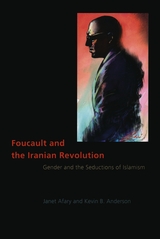
In this important and controversial account, Janet Afary and Kevin B. Anderson illuminate Foucault's support of the Islamist movement. They also show how Foucault's experiences in Iran contributed to a turning point in his thought, influencing his ideas on the Enlightenment, homosexuality, and his search for political spirituality. Foucault and the Iranian Revolution informs current discussion on the divisions that have reemerged among Western intellectuals over the response to radical Islamism after September 11. Foucault's provocative writings are thus essential for understanding the history and the future of the West's relationship with Iran and, more generally, to political Islam. In their examination of these journalistic pieces, Afary and Anderson offer a surprising glimpse into the mind of a celebrated thinker.
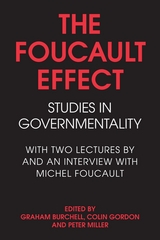
Foucault's thoughts on political discourse and governmentality are supplemented by the essays of internationally renowned scholars. United by the common influence of Foucault's approach, they explore the many modern manifestations of government: the reason of state, police, liberalism, security, social economy, insurance, solidarity, welfare, risk management, and more. The central theme is that the object and the activity of government are not instinctive and natural things, but things that have been invented and learned.
The Foucault Effect analyzes the thought behind practices of government and argues that criticism represents a true force for change in attitudes and actions, and that extending the limits of some practices allows the invention of others. This unique and extraordinarily useful collection of articles and primary materials will open the way for a whole new set of discussions of the work of Michel Foucault as well as the status of liberalism, social policy, and insurance.
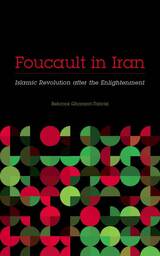
Were the thirteen essays Michel Foucault wrote in 1978–1979 endorsing the Iranian Revolution an aberration of his earlier work or an inevitable pitfall of his stance on Enlightenment rationality, as critics have long alleged? Behrooz Ghamari-Tabrizi argues that the critics are wrong. He declares that Foucault recognized that Iranians were at a threshold and were considering if it were possible to think of dignity, justice, and liberty outside the cognitive maps and principles of the European Enlightenment.
Foucault in Iran centers not only on the significance of the great thinker’s writings on the revolution but also on the profound mark the event left on his later lectures on ethics, spirituality, and fearless speech. Contemporary events since 9/11, the War on Terror, and the Arab Uprisings have made Foucault’s essays on the Iranian Revolution more relevant than ever. Ghamari-Tabrizi illustrates how Foucault saw in the revolution an instance of his antiteleological philosophy: here was an event that did not fit into the normative progressive discourses of history. What attracted him to the Iranian Revolution was precisely its ambiguity.
Theoretically sophisticated and empirically rich, this interdisciplinary work will spark a lively debate in its insistence that what informed Foucault’s writing was not an effort to understand Islamism but, rather, his conviction that Enlightenment rationality has not closed the gate of unknown possibilities for human societies.
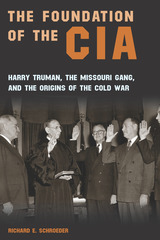
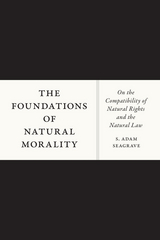
With The Foundations of Natural Morality, S. Adam Seagrave addresses this controversy, offering an entirely new account of natural morality that compellingly unites the concepts of natural law and natural rights. Seagrave agrees with Strauss that the idea of natural rights is distinctly modern and does not derive from traditional natural law. Despite their historical distinctness, however, he argues that the two ideas are profoundly compatible and that the thought of John Locke and Thomas Aquinas provides the key to reconciling the two sides of this long-standing debate. In doing so, he lays out a coherent concept of natural morality that brings together thinkers from Plato and Aristotle to Hobbes and Locke, revealing the insights contained within these disparate accounts as well as their incompleteness when considered in isolation. Finally, he turns to an examination of contemporary issues, including health care, same-sex marriage, and the death penalty, showing how this new account of morality can open up a more fruitful debate.
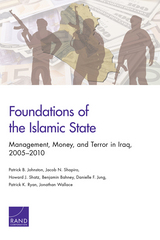

Although both the League of Nations and the Permanent Court of International Justice were rejected by the U.S. Senate, Boyle shows how the early governance of these institutions—precursors, respectively, to the United Nations and the International Court of Justice—informed later efforts to reduce and regulate transnational threats and the use of military force. Delving into such topics as the United States and its initial stance of neutrality in World War I and its imperial policy toward Latin America and the Caribbean, Boyle offers detailed readings of the relevant treaties, tribunals, and conferences, and assesses the political actors involved. Taking up the legalist point of view, he discusses the codification of customary international law, the obligatory arbitration of international disputes, and the creation of a new regime for the settlement of such disputes.
Boyle has provided in Foundations of World Order a compelling portrait of the relationship between political power and law, and of the impact of these forces on U.S. diplomacy. This volume will serve as a valuable resource to students, scholars, and practitioners of international law; it will also be of great interest to historians and political scientists engaged with issues of U.S. foreign policy and diplomatic history.
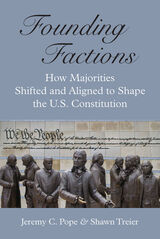
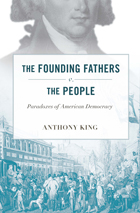
As pundits and politicians remind us at every election cycle or turn of the television dial, the United States sees itself as the world’s greatest democracy. But what citizens might also hear, if they knew how to listen, is the grinding of two tectonic plates on which this democracy was established. In the venerable tradition of keen foreign observers of American politics, Anthony King exposes the political paradoxes in our system that we may well be too close to see—founding principles of our great democracy that are distinctly undemocratic.
In an extended essay eloquent in its plainspoken good sense, King begins, on the one hand, with the founding fathers who emphasized moderation, deliberation, checks and balances, and the separation of powers—a system in which “the people” were allowed to play only a limited role. On the other hand were radical democrats who insisted that the people, and only the people, should rule. The result was a political system tangled up in conflicts that persist to this day: unelected and unaccountable Supreme Court justices who exercise enormous personal power; severe restrictions on the kind of person the people can elect as president; popular referendums at the state and local level but none at the federal level, not even to ratify amendments to the Constitution.
In King’s provocative analysis, we see how these puzzles play out in the turmoil of our nation’s public life and political culture—and we glimpse, perhaps, a new way to address them.

Founding Fictions develops the concept of a “political fiction,” or a narrative that people tell about their own political theories, and analyzes how republican and democratic fictions positioned American citizens as either romantic heroes, tragic victims, or ironic partisans. By re-telling the stories that Americans have told themselves about citizenship, Mercieca highlights an important contradiction in American political theory and practice: that national stability and active citizen participation are perceived as fundamentally at odds.

A Financial Times Best Book of the Year
A Guardian Best Architecture Book of the Year
“Sharp, revealing, funny.”
—The Guardian
“An original and even occasionally hilarious book about losing ideals and finding them again… [De Graaf] deftly shows that architecture cannot be better or more pure than the flawed humans who make it.”
—The Economist
Architecture, we like to believe, is an elevated art form that shapes the world as it pleases. Four Walls and a Roof turns this fiction on its head, offering a candid account of what it’s really like to work as an architect. Drawing on his own tragicomic experiences in the field, Reinier de Graaf reveals the world of contemporary architecture in vivid snapshots: from the corridors of wealth in London, Moscow, and Dubai to the demolished hopes of postwar social housing in New York and St. Louis. We meet ambitious oligarchs, developers for whom architecture is nothing more than an investment, and layers of bureaucrats, consultants, and mysterious hangers-on who lie between any architect’s idea and the chance of its execution.
“This is a book about power, money and influence, and architecture’s complete lack of any of them… Witty, insightful and funny, it is a (sometimes painful) dissection of a profession that thinks it is still in control.”
—Financial Times
“This is the most stimulating book on architecture and its practice that I have read for years.”
—Architects’ Journal
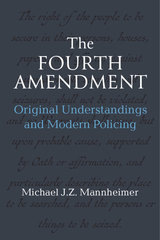
Police are required to obey the law. While that seems obvious, courts have lost track of that requirement due to misinterpreting the two constitutional provisions governing police conduct: the Fourth and Fourteenth Amendments. The Fourth Amendment forbids "unreasonable searches and seizures" and is the source of most constitutional constraints on policing. Although that provision technically applies only to the federal government, the Fourteenth Amendment, ratified in the wake of the Civil War, has been deemed to apply the Fourth Amendment to the States.
This book contends that the courts’ misinterpretation of these provisions has led them to hold federal and state law enforcement mistakenly to the same constitutional standards. The Fourth Amendment was originally understood as a federalism, or “states’ rights,” provision that, in effect, required federal agents to adhere to state law when searching or seizing. Thus, applying the same constraint to the States is impossible. Instead, the Fourteenth Amendment was originally understood in part as requiring that state officials (1) adhere to state law, (2) not discriminate, and (3) not be granted excessive discretion by legislators. These principles should guide judicial review of modern policing. Instead, constitutional constraints on policing are too strict and too forgiving at the same time. In this book, Michael J.Z. Mannheimer calls for a reimagination of what modern policing could look like based on the original understandings of the Fourth and Fourteenth Amendments.
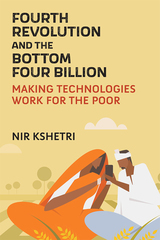
Products and services based on advanced technologies such as artificial intelligence and blockchain are normally considered to be for rich consumers in advanced countries. Fourth Revolution and the Bottom Four Billion demonstrates how marginalized and vulnerable groups with limited resources can also benefit from these technologies. Nir Kshetri suggests that the falling costs and the increased ease of developing and deploying applications based on these technologies are making them more accessible. He illustrates how key emerging technologies are transforming major industries and application areas such as healthcare and pandemic preparedness, agriculture, finance, banking, and insurance. The book also looks at how these transformations are affecting the lives of low-income people in low- and middle-income countries and highlights the areas needing regulatory attention to adequately protect marginalized and vulnerable groups from the abuse and misuse of these technologies. Kshetri discusses how various barriers such as the lack of data, low resource languages, underdeveloped technology infrastructures, lack of computing power and shortage of skill and talent have hindered the adoption of these technologies among marginalized and vulnerable groups. Fourth Revolution and the Bottom Four Billion suggests that it is the responsibility of diverse stakeholders—governments, NGOs, international development organizations, academic institutions, the private sector, and others—to ensure that marginal groups also benefit from these transformative innovations.
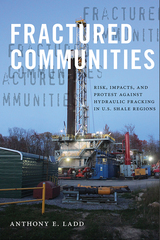

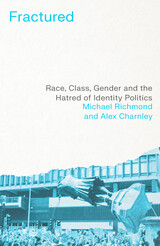
Identity politics has smeared political discourse for over a decade. The right uses it to lament the loss of free speech, while many on the left bemoan that it will be the end of class politics. It has been used to dismiss movements such as Black Lives Matter and brought seemingly progressive people into the path of fascism. It has armed the march of the transphobes.
In Fractured, the authors move away from the identity politics debate. Instead of crudely categorizing race, gender, and sexuality as 'identities', or forcing them under the heading of 'diversity', they argue that the interconnectedness of these groupings has always been inseparable from the history of class struggle under British and American capitalism.
Through an appraisal of pivotal historical moments in Britain and the US, and a sharp look at contemporary debates, the authors tame the frenzied culture war, offering a refreshing and reasoned way to understand how class struggle is formed and creating the possibilities for new forms of solidarity in an increasingly fractured world.
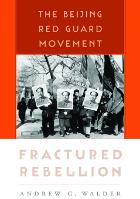
Fractured Rebellion is the first full-length account of the evolution of China’s Red Guard Movement in Beijing, the nation’s capital, from its beginnings in 1966 to its forcible suppression in 1968. Andrew Walder combines historical narrative with sociological analysis as he explores the radical student movement’s crippling factionalism, devastating social impact, and ultimate failure.
Most accounts of the movement have portrayed a struggle among Red Guards as a social conflict that pitted privileged “conservative” students against socially marginalized “radicals” who sought to change an oppressive social and political system. Walder employs newly available documentary evidence and the recent memoirs of former Red Guard leaders and members to demonstrate that on both sides of the bitter conflict were students from comparable socioeconomic backgrounds, who shared similar—largely defensive—motivations. The intensity of the conflict and the depth of the divisions were an expression of authoritarian political structures that continued to exert an irresistible pull on student motives and actions, even in the midst of their rebellion.
Walder’s nuanced account challenges the main themes of an entire generation of scholarship about the social conflicts of China’s Cultural Revolution, shedding light on the most tragic and poorly understood period of recent Chinese history.
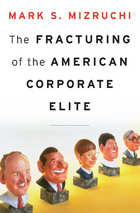
In the aftermath of a financial crisis marked by bank-friendly bailouts and loosening campaign finance restrictions, a chorus of critics warns that business leaders have too much influence over American politics. Mark Mizruchi worries about the ways they exert too little. The Fracturing of the American Corporate Elite advances the surprising argument that American CEOs, seemingly more powerful today than ever, have abrogated the key leadership role they once played in addressing national challenges, with grave consequences for American society.
Following World War II, American business leaders observed an ethic of civic responsibility and enlightened self-interest. Steering a course of moderation and pragmatism, they accepted the legitimacy of organized labor and federal regulation of the economy and offered support, sometimes actively, as Congress passed legislation to build the interstate highway system, reduce discrimination in hiring, and provide a safety net for the elderly and needy. In the 1970s, however, faced with inflation, foreign competition, and growing public criticism, corporate leaders became increasingly confrontational with labor and government. As they succeeded in taming their opponents, business leaders paradoxically undermined their ability to act collectively. The acquisition wave of the 1980s created further pressures to focus on shareholder value and short-term gain rather than long-term problems facing their country.
Today’s corporate elite is a fragmented, ineffectual group that is unwilling to tackle the big issues, despite unprecedented wealth and political clout. Mizruchi’s sobering assessment of the dissolution of America’s business class helps explain the polarization and gridlock that stifle U.S. politics.
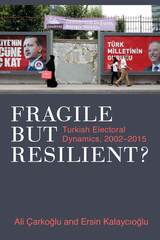
Ersin Kalaycıoğlu and Ali Çarkoğlu, who conducted surveys comparable to the American National Election Survey for the 2002 and 2015 national elections in Turkey, chart the dynamics that brought the pro-Islamist conservative Justice and Development Party (Adalet ve Kalkınma Partisi-AKP) to power in 2002, and that continue to influence electoral politics. The authors trace the uneven course of democratization in Turkey, as revealed through elections, since the first competitive, multi-party elections in 1950. Since the market liberalization reforms of 1980, Turkey has been rapidly evolving from a closed, agricultural, comparatively underdeveloped polity into an open and industrial state primarily integrated with the global economy. Kalaycıoğlu and Çarkoğlu analyze different dimensions of five elections surveys in 2002-2015 period to show how the consequent socio-economic changes and traditional socio-cultural divisions have affected elections, political parties, and individual voters. The authors conclude that the historical-cultural divide between rural, peripheral, conservative groups and more urban, centrist, and modernized groups not only persists but shapes elections more than ever. This book not only provides an original comprehensive and critical evaluation of the Turkish electoral and party politics, it also offers a case study of voting behavior in a state undergoing both democratization and market liberalization in a rapidly changing and volatile international environment.
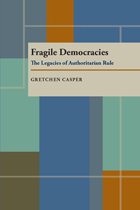
Examining the Marcos and Aquino administrations in the Philippines, and a number of cases in Latin Amarica, Casper discusses the legacies of authoritarianism and shows how difficult it is for popularly elected leaders to ensure that democracy will flourish. Authoritarian regimes leave an imprint on society long after their leaders have been overthrown because they transform or destroy the social institutions on which a successful democracy depends. Casper concludes that redemocratization is problematic, even in countries with strong democratic traditions.
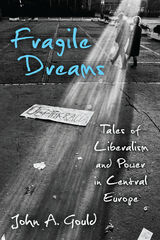
In Fragile Dreams, John A. Gould examines Central European communism, why it failed, and what has come since. Moving loosely chronologically from 1989 to the present, each chapter focuses on topics of importance to the fields of comparative politics, sociology, and feminist and gender studies. He draws heavily from his own research and experience as well as case studies of the former Czechoslovakia, Western Balkans, and Hungary—but much of the analysis has general applicability to the broader postcommunist region.
Broad in its coverage, this academically rigorous book is ideal for students, travelers, and general readers. Gould writes in the first person and seamlessly blends theory with stories both from the existing literature and from 30 years of regional personal experience with family and friends. Throughout, Gould introduces key concepts, players, and events with precise definitions. Wherever possible, he emphasizes marginalized narratives, centering theory and stories that are often overlooked in standard comparative political science literature.
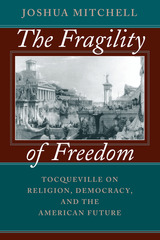
Focusing on Democracy in America, The Fragility of Freedom examines Tocqueville's key works and argues that his analysis of democracy is ultimately rooted in an Augustinian view of human psychology. As much a work of political philosophy as of religion, The Fragility of Freedom argues for the importance of a political theology that recognizes moderation.
"An intelligent and sharply drawn portrait of a conservative Toqueville."—Anne C. Rose, Journal of American History
"I recommend this book as one of a very few to approach seriously the sources of Tocqueville's intellectual and moral greatness."—Peter Augustine Lawler, Journal of Politics
"Mitchell ably places Democracy in America in the long conversation of Western political and theological thought."—Wilfred M. McClay, First Things
"Learned and thought-provoking."—Peter Berkowitz, New Republic
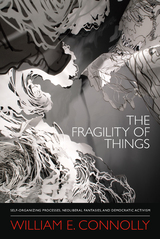
READERS
Browse our collection.
PUBLISHERS
See BiblioVault's publisher services.
STUDENT SERVICES
Files for college accessibility offices.
UChicago Accessibility Resources
home | accessibility | search | about | contact us
BiblioVault ® 2001 - 2024
The University of Chicago Press









